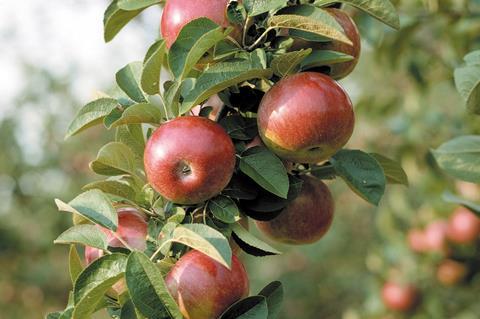British Apples & Pears Limited unveils retailer rankings for British apple sales during first four months of apple season

Aldi has topped British Apples & Pears (BAPL) new season retailer rankings, which reveal which supermarkets were best at backing British apples in the first four months of the 2024/25 UK apple deal.
According to BAPL figures, Aldi sold 23 per cent (11,824 tonnes) of all UK apples bought from BAPL growers between September and December 2024 – significantly outperforming its grocery market share of 10 per cent.
Tesco, meanwhile, took some time to get going and only topped the British apple volume charts in December 2024, having been third in the league tables behind Aldi and Lidl in September and October.
However, the UK’s biggest retailer stepped up its game in December 2024, achieving the highest volume of British apples (2,734 tonnes) of all supermarkets that month.
Tesco’s new season volumes equate to 18 per cent of all British apples supplied by BAPL growers between September and December 2024, underperforming against its grocery market share of 28.5 per cent, BAPL said.
Like its fellow discounter, Lidl also outperformed compared to its grocery market share, buying 16 per cent (8,499 tonnes) of all British apples sold by BAPL growers compared to its 7.3 per cent grocery market share.
This puts the retailer third in the league table for the first four months of the current season and pushes Sainbury’s into fourth place.
Despite being in fourth place, Sainsbury’s performed well, buying 16 per cent (8,281 tonnes) of all British apples sold by BAPL growers between September and December 2024 perfectly matching its 16 per cent grocery market share, BAPL said.
Marks & Spencer and Waitrose also performed well between September and December 2024 – purchasing 2,911 tonnes and 2,707 tonnes of British apples respectively. These volumes meant both retailers’ purchase of British apples surpassed their grocery market share.
Meanwhile, Asda – which had been a disappointment in 2023, buying just 5 per cent of all British apples sold by BAPL growers compared to its market share of 13.6 per cent – has redeemed itself this season, according to BAPL. In 2024, the retailer had the best year-on-year performance, buying 1,044 tonnes more than the same period last year, the grower group said.
Unlike Iceland, which registered zero purchases of British apples from BAPL growers at the start of this season.
Commenting on the latest sales figures, BAPL executive chair Ali Capper, said: “The start of the new British apple season is a crucial time for our growers. We know shoppers are very keen to get their hands on the delicious new season fruit and we’ve had some great support from many UK retailers.
“Once again Aldi and Lidl significantly outperformed against their grocery market share and really got behind British top fruit. However, they are facing strong competition from Tesco as it finally got to the top of the new season league table in December 2024.”
She addded: “British apple production volumes are keeping pace with previous years. October to December 2023 saw a total volume of 45,901 tonnes of British apples being sold by BAPL growers to UK retailers, compared to 45,404 tonnes in the same period in 2024. Supply remains good and the quality of the fruit is excellent, so we’d urge all the retailers to continue their support by buying British.”
BAPL publishes monthly sales data on its website: https://www.britishapplesandpears.co.uk/supermarket-sales-data/
The following table provides an aggregated summary of the first four months of the 2024/25 British apple season (September to December 2024 inclusive).
| Retailer | British apples tonnes sold | % of all British apples sold | Grocery market share 29 Dec 2024 |
|---|---|---|---|
|
Aldi |
11,824 |
22.7% |
10.0% |
|
Tesco |
9,517 |
18.2% |
28.5% |
|
Lidl |
8,499 |
16.3% |
7.3% |
|
Sainsbury’s |
8,281 |
15.9% |
16.0% |
|
Asda |
3,785 |
7.3% |
12.5% |
|
M&S |
2,911 |
5.6% |
3.7% |
|
Waitrose |
2,707 |
5.2% |
4.6% |
|
Morrisons |
2,545 |
4.9% |
8.6% |
|
Co-op |
1,320 |
2.5% |
5.3% |
|
Others |
776 |
1.5% |
4.8% |
|
Iceland |
0 |
0.0% |
2.3% |



